
Yugoslavia was a country in Southeast and Central Europe that existed from 1918 to 1992.
Foreign relations of Serbia are accomplished by efforts of the Ministry of Foreign Affairs. Serbia has inherited the Ministry of Foreign Affairs, along with all of its holdings, after the dissolution of the previous state union with Montenegro. Serbian foreign ministries continue to serve citizens of Montenegro in countries that do not have Montenegrin diplomatic presence. The governments of Serbia and Montenegro expressed an interest in pursuing a common foreign policy. Former President of Serbia Boris Tadić referred to relations with the European Union (EU), Russia, United States and China as the four pillars of foreign policy. Serbia joined the United Nations on 1 November 2000.
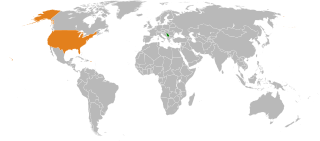
Relations between Serbia and the United States were first established in 1882, when Serbia was a kingdom. From 1918 to 2006, the United States maintained relations with the Kingdom of Yugoslavia, the Socialist Federal Republic of Yugoslavia (SFRY), and the Federal Republic of Yugoslavia (FRY), of which Serbia is considered shared (SFRY) or sole (FRY) legal successor.

Russia–Serbia relations are the bilateral foreign relations between the Russian Federation and the Republic of Serbia. The countries established official diplomatic relations as the Russian Empire and Principality of Serbia in 1816. Russia has an honorary consulate and embassy in Belgrade, and a liaison office to UNMIK, the capital of the disputed territory of Kosovo. Serbia has an embassy in Moscow, an honorary consulate in St. Petersburg and has announced to open a consulate-general in Yekaterinburg.
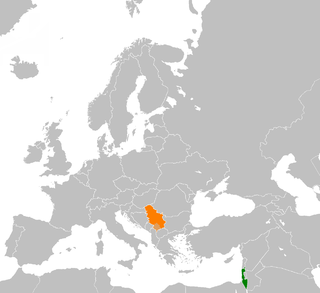
The diplomatic relations between Israel and Serbia were established on January 31, 1992, when Serbia was part of FR Yugoslavia. Israel has an embassy in Belgrade and Serbia had one in Tel Aviv. Yugoslavia was the second country in Europe to recognize Israel in 1948. The two countries have economic and cultural ties, helped by a sizable community of Jews from the former Yugoslavia in Israel. Serbia agreed to move its embassy to Jerusalem on 4 September 2020 but decided not to after Israeli recognition of Kosovo as a sovereign state, something Serbia disputes.

Relations between Hungary and Serbia, or Serbo-Hungarian relations form a part of the wider politics of Central and Southeast Europe. The two countries have a long relationship stretching back to the Middle Ages. History of official diplomatic relations of Hungary and Serbia dates back to 21 November 1882, when they were established between the Kingdom of Serbia and Austria-Hungary. Today, Hungary has an embassy in Belgrade and a general consulate in Subotica, while Serbia has an embassy in Budapest and an honorary consulate in Szeged.

French-Serbian relations are foreign relations between France and Serbia. Both countries established diplomatic relations on 1839, between the French Third Republic and the Principality of Serbia. Both countries are members of the United Nations, the Council of Europe, the Partnership for Peace, and the Organization for Security and Co-operation in Europe (OSCE). After a short period of severance caused by the 1999 NATO bombing of Yugoslavia, France's diplomatic relations with Serbia were restored on 16 November 2000. Since 2006, Serbia is an observer on the Francophonie. France is also an EU member and Serbia is an EU candidate. There are between 70,000 and 100,000 people of Serbian descent living in France.

Mexico–Serbia relations are the diplomatic relations between Mexico and Serbia. Both nations were founding members of the Group of 77 and the United Nations.
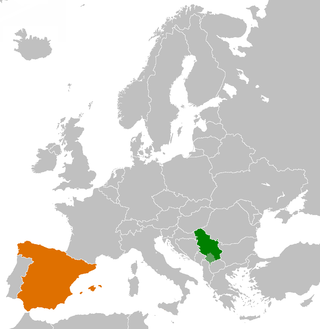
Serbian-Spanish relations are foreign relations between Serbia and Spain. Both countries established diplomatic relations on October 14, 1916. Serbia has an embassy in Madrid. Spain has an embassy in Belgrade. Both countries are member states of the United Nations, Interpol, Council of Europe and Organization for Security and Co-operation in Europe. Spain is member state of the European Union since 1986 and Serbia is a candidate country since 2012 negotiating its future membership which Spain is strongly supporting. Spain is member state of NATO alliance while Serbia is a militarily neutral country with strong historical relations with the Non-Aligned Movement. In relation to third parties, both countries supported position of Argentina in its Falkland Islands sovereignty dispute with the United Kingdom in the past.

Relations between Albania and Serbia have been complex and largely unfriendly due to a number of historical and political events.

Serbian–Turkish relations are foreign relations between Serbia and Turkey. Serbia has an embassy in Ankara and a consulate-general in Istanbul. Turkey has an embassy in Belgrade. Both countries are full members of the Council of Europe, the Organization for Security and Co-operation in Europe (OSCE), the Central European Free Trade Agreement (CEFTA) and the Organization of the Black Sea Economic Cooperation (BSEC). Turkey is a member of NATO. Serbia instead is not a member of NATO.

The Palestinian–Serbian relations are bilateral relations between the State of Palestine and the Republic of Serbia. Relations between Serbia and Palestine have been very close and friendly.

North Korea–Serbia relations are the bilateral relations between Serbia and North Korea. The Socialist Federal Republic of Yugoslavia and the Democratic People's Republic of Korea had established diplomatic relations on October 30, 1948. Relations had been very close during the time of Josip Broz Tito and Kim Il Sung. Both leaders had taken a neutral stance during the Sino-Soviet split and maintained friendly relations with both the Soviet Union and China. Both Serbia and North Korea are members of the Non-Aligned Movement. Yugoslavia, of which Serbia was a part, was one of the movement's founding members. Both countries closed their embassies in each other's capitals in October and November 2001, respectively, for financial reasons. Nevertheless, they continue to enjoy a close relationship. The Serbian Embassy to North Korea is accredited from Beijing, China, and the North Korean embassy to Serbia is accredited from Bucharest, Romania.

Finland–Yugoslavia relations were historical foreign relations between Finland and now split-up Kingdom of Yugoslavia or Socialist Federal Republic of Yugoslavia. Both countries gained their independence during or in the immediate aftermath of the World War I and the collapse of Austria-Hungary (Yugoslavia) or Russian Empire (Finland). Two parties established formal bilateral relations in 1928. Two countries developed their relations after the end of the World War II and 1948 Tito–Stalin split. At the time neither one of them was a part of either Eastern or Western Bloc in the Cold War divided Europe. Both countries perceived development of relations among non-bloc neutral European states as a way to avoid isolation and preserve certain level of independence without alienating major powers. Belgrade however perceived that in deeply divided Europe there was shrinking maneuvering space for neutral countries and followed the development of what will be called process of Finlandization with great concern. It therefore turned its focus on new allies among former colonies and mandate territories outside of Europe where it developed its policy of equidistant active neutrality via its activities in the newly founded Non-Aligned Movement.

Albania–Yugoslavia relations were historical foreign relations between Albania and now broken up Yugoslavia. With occasional periods of friendly relations or efforts to improve relations, the two countries predominantly maintained cold or openly hostile relations. The period of close relations developed right after the end of World War II when Yugoslavia pushed for socioeconomic integration of Albania into Yugoslavia within the Balkan Federation, but they turned into sharp antagonism after the 1948 Tito–Stalin split.

United States–Yugoslavia relations were the historical foreign relations of the United States with both Kingdom of Yugoslavia and Socialist Federal Republic of Yugoslavia (1945–1992). During the existence of the SFRY, relations oscillated from mutual ignorance, antagonism to close cooperation, and significant direct American engagement. The United States was represented in Yugoslavia by its embassy in Belgrade and consulate general in Zagreb.
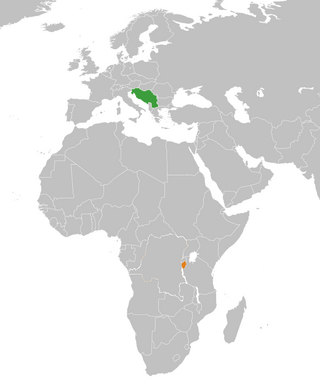
Burundi and the former Socialist Federal Republic of Yugoslavia were both members of the Non-Aligned Movement and they developed their relations in the framework of the Cold War Third World cooperation.

Japan–Yugoslavia relations were historical foreign relations between Japan and now split-up Yugoslavia. Japan promoted friendly relations and appreciated Socialist Yugoslavia's independent non-aligned foreign policy stance.

United Kingdom–Yugoslavia relations were historical foreign relations between United Kingdom and former Yugoslavia. Relations between United Kingdom and independent South Slavic states developed before creation of Yugoslavia following the decline of the Ottoman Empire.
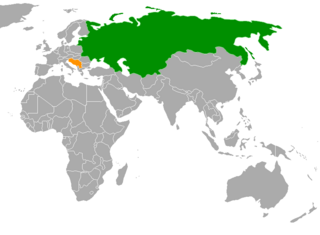
Soviet Union–Yugoslavia relations were historical foreign relations between Soviet Union and Yugoslavia. Both states are now-defunct states with dissolution of the Soviet Union from 1988 through 1991 and breakup of Yugoslavia from 1991 through 1992. Relations between the two countries developed very ambiguously. Until 1940 they were openly hostile, in 1948 they deteriorated again and in 1949 were completely broken. In 1953–1955 period, bilateral relations were restored with the signing of Belgrade declaration, but until the collapse of Yugoslavia they remained very restrained. Relations with Soviet Union were of high priority for Belgrade as those relations or their absence helped the country to develop the principle of Cold War equal-distance on which the Yugoslav non-alignment policy was based.





















